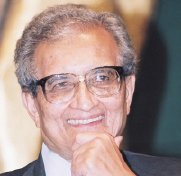Note: this interview was broadcast by the WGBH affiliate WCAI, the Cape and Islands NPR station and by KPIP in Missouri.
You’ve heard the news. Online education is the next big, disruptive thing. It’s taking on the establishment, and the hidebound, bricks and mortar institutions of higher learning must change – or shrink.
EdX, Coursera, Udacity and the like are the future – promising us a better educated and better employed nation of newly empowered citizens.
Or — they’re the tool that leads to the firing of second rate, redundant professors across the land, to the retreat of non-virtual classrooms, those sacrosanct spaces where real students interact with real professors.
Or perhaps they’re both? These cultural and marketplace issues will work themselves out over time. But if we look farther ahead, what will be the political impact of “free education for all,” across the globe? (Albeit for those with a high speed internet connection!)
ThoughtCast spoke with Anant Agarwal, formerly the Director of MIT’s Computer Science and Artificial Intelligence Laboratory, and currently the very first President of edX, in their spanking new offices in Cambridge, Massachusetts. An entrepreneur and an intellectual, Anant is perhaps also a visionary.
Will his visions for edX come true? Take a listen, and judge for yourself!
Also, for extra credit —
What does the “X” in edX stand for?
Click here:  (1 minute).
(1 minute).
Podcast: Play in new window | Download
Subscribe: RSS



 Amartya Sen, the distinguished economist, philosopher, Nobel laureate and Harvard professor, talks with ThoughtCast about “Identity and Violence: The Illusion of Destiny.”
Amartya Sen, the distinguished economist, philosopher, Nobel laureate and Harvard professor, talks with ThoughtCast about “Identity and Violence: The Illusion of Destiny.”